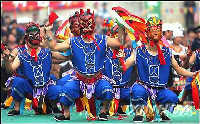Masked performers with whips dance to the sound of different mysterious tunes -- some wearing black, white or red masks with varied expressions -- from the amiable to the frightening and ferocious.
But with the passage of time and increasing popularization of science, the primitive, superstitious ritual has now been transformed into a theatrical performance for entertainment purposes.
"Formerly, the ritual gave expression to the uncertainty of primitive people towards the unknown world and universe, but, nowadays, the most fascinating part is the vivid nuo drama that follows," said Tuo Xiuming, a noted scholar and director of the China Southwest Nuo Culture Research Center.
 Guizhou Province is famous for the greatest varieties of nuo drama. Wherever there is a Nuo drama performance in a village, farmers from surrounding villages will hike for dozens of kilometers to watch. Although some elderly people still have awe and reverence for the nuo dancing "gods", fewer and fewer are now familiar with the content and expertise of the ritual.
Guizhou Province is famous for the greatest varieties of nuo drama. Wherever there is a Nuo drama performance in a village, farmers from surrounding villages will hike for dozens of kilometers to watch. Although some elderly people still have awe and reverence for the nuo dancing "gods", fewer and fewer are now familiar with the content and expertise of the ritual.
But in the eyes of researchers, nuo, which has a harmonizing force in village society life, is gradually fading away.
"The pressing issue now is how to protect it from extinction," said Qu Liuyi, director of the China Nuo Drama Research Association.
"The opera contains a general knowledge about religion, society and ethnic groups of the early stages of human development and provides an important reference value to the in-depth study of music, dance and painting, as well as other arts."
Nuo cultural studies have become a hot topic for academics. At a seminar held recently in Guizhou Province, more than 100 experts from China and abroad discussed protection efforts.
